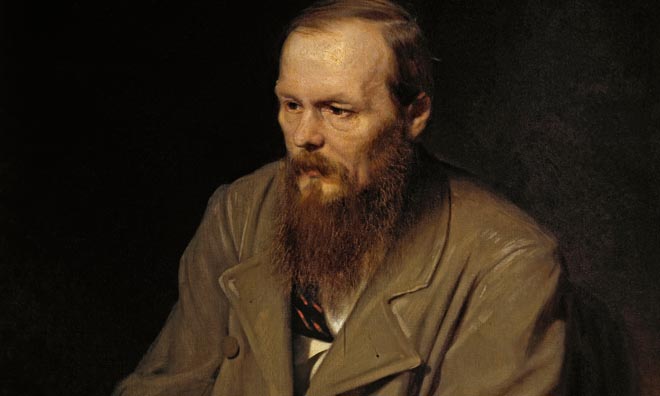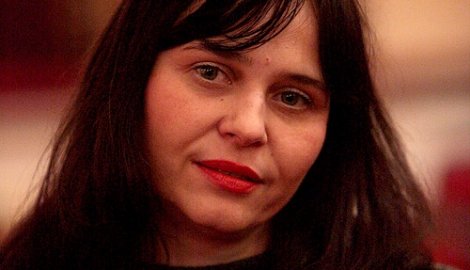The possessed
T .M. Rigonat, after F. M. Dostoyevsky's piece

ABOUT THE TITLE
Title of the novel comes from the Gospel, from the part where demons are mentioned. Christ exorcised demons from a man and sent them to a group of pigs; the pigs then went into a lake and drowned. Decisive moment of the account (Luke, VIII, 32-36) has been cited as a motto, therefore, Dostoyevsky names his novel with бесы (plural of бес). Nonetheless, the original meaning (“demons from hell”) has been suppressed by associations and secondary meanings as the time went by. Etymology could be found in verbs and adjectives that – as in the phrase “possessed by Devil” – signify various sorts of meaningless anger, rage and craziness (to беснилка); at the same time, Devil (as “spirit of hell” – diabolus) is known as чорт. When the old word бес is concerned, it became increasingly connected with a vicious being, at times dangerous and at times mischievous and malicious, not directly connected to hell (чорт is always used in scolding and swearing, while бес can be used as joking word for Devil – especially for a “playful Devil”). Next to the quote from Gospel, there is another motto: part of Pushkin’s poem of the same title as Dostoyevsky’s novel. The poem is about a traveller who found himself in a snowstorm at night, the snowstorm invokes images of ghosts that howl and squeal. When asked to drive faster, the carriage driver says “There is no trace of the road, we are lost – what can be done? There must be a vicious demon (бес) who is leading us in circles in these fields”.
Maximilian Braun, Dostoyevsky – His Works
and Their Diversity and Unity, Izdavačka knjižnica Zorana Stojanovića, Sremski Karlovci – Novi Sad, 2008
 FYODOR MIKHAYLOVICH DOSTOYEVSKY (1821–1881)
FYODOR MIKHAYLOVICH DOSTOYEVSKY (1821–1881)
Nikolai Berdyaev wrote that Dostoyevsky could not be imagined outside literature. His biography is completely dedicated to literature. He was a professional writer. As soon as he graduated from the Military Academy at the age of twenty-two, he asked to be discharged from the army in order to support himself exclusively from writing. At the time, he has written two (lost) dramas – Mary Stewart and Eugene Onegin and he has published a translation of Eugenia Grande by Balzac. Since that moment, he has lived off his literature until he died. He wrote constantly, even while on death row in Petropavlovska Fortress, where he waited for execution as a member of Petrashevsky Circle (story A Little Hero). During his exile in Siberia and in Tver (The Village of Stepanchikovo and Uncle’s Dream). While struggling to support himself, he published stories and novels in literary magazines, always taking a lot of effort to end each sequel with enough tension and uncertainty in order to make sure that readers would buy the next issue of The Russian Word, The Petersburg’s Scripts, The Gazette, The Epoch or the magazine The Vreme, which was edited by his brother Mikhail. Leo Shestov divided Dostoyevsky’s works into pieces written before and after Notes from Underground. The first phase in his work starts with his first novel Poor Folk (1846) and continues with The Double (1846), Netochka Nezvanova (1849, he was imprisoned after the first two volumes). Shestov noticed that Dostoyevsky had published his most optimistic piece The Village of Stepanchikovo and Uncle’s Dream (1859) after imprisonment and exile, after which the literary critics proclaimed him a literary dead writer. However, in 1890 he published first collection of works, he finished Humiliated and Insulted, while the novel The House of the Dead (1861) accomplished a tremendous success. Dostoyevsky reclaimed his literary reputation and could easily have spent the rest of his life writing Winter Notes on Summer Impressions (1862), however, although a professional who lives of literary fees, Dostoyevsky starts a marvellous struggle to ask and find answers to the most important issues of his time. He employs all literary and academic powers into unscrambling “the secret of man”, the new “underground man”, who killed the God and who is, therefore, “allowed to do everything”. He searches for answers to issues of modern individualism, freedom, rebellion, evil, immanent end of humanism. At the same time, he lived in utter poverty. He was forced to dictate The Gambler to a secretary in order to finish the novel within deadline, and to submit it to the publisher after only two weeks, so as not to lose author’s rights for his works over debts. Subsequently, he writes his masterpieces: Crime and Punishment (1866), Idiot (1868), The Possessed (1871), The Brothers Karamazov (1879). He wrote until his last breath, literally – January sequel of A Writer’s Diary (published since 1873) was published only a few days before Dostoyevsky’s death.
 TANЈA MANDIĆ RIGONAT
TANЈA MANDIĆ RIGONAT
Tanja graduated in Theatre and Radio Directing at the Faculty of Dramatic Arts in Belgrade, from the class of Professor Dejan Mijač.
THEATRE PRODUCTIONS:
Lovely Rita by T. Brash – SKC
Miss Julie by A. Strindberg – Atelje 212
The Hilarious Tragedy, D. Kovačević – National Theatre “Sterija“ Vršac
Lolita by V. Nabokov – Bitef Theatre
George Washington’s Loves by M. Gavran – Atelje 212
Autumn Sonata by I. Bergman – National Theatre in Belgrade
Verica among Plum Trees by M. Bobić-Mojsilović (first cooperation with Svetlana Bojković, Audience’s Award in Zemun Monodrama Festival)
Talula by J. Strein – BELEF
The Man of Coincidences by J. Reza – National Theatre in Belgrade (Petar Banićević got “Raša Plaović’ Award – the best actor in 2000-01 season)
Collected Stories by D. Margulies – Atelje 212
Ear, Throat, Knife by V. Rudan – Atelje 212
Dead Ears by O. Bogayev – National Theatre in Sombor...
Terrace, J. Hristić – Yugoslav Drama Theatre
Icy Firefly, V. Radoman – Madlenianum
Oxygen, I. Viripaev - BELEF / Yugoslav Drama Theatre
The Judge, V. Moberg – National Theatre in Belgrade
Love Letter, F. Arrabal – BITEF / Cervantes
Hitler and Hitler, K. Kostjenko – Atelje 212
Sexual Neuroses of Our Parents, L. Berfus – National Theatre in Belgrade (Best Play of the National Theatre in season 2007/2008; International Festival in Rijeka: “Veljko Maričić“ Award for the Best Female Role to Nada Šargin and Award for the Best Supporting Actor to Igor Ðorđević, Jury’s Award of Mediterranean Journal to Nada Šargin)
Fireflies, T. Štivičić – Atelje 212
Wait for me in the sky, my love, F. Arabal - Madlenianum
DRAMATIZATIONS:
Novel Lolita (with Biljana Maksić)
Charles Bukowski’s stories The Devil Was Hot
Novel Dead Souls by N. V. Gogol (directed by Dejan Mijač).
The Possessed, a novel by F. M. Dostoyevsky
She has also written, dramatized and directed a number of radio dramas.
She is the author of two books of poetry Mystery of a Happy Contrabass and From the Lives of Birds. In 2008, she was a selector in Sterijino Pozorje Festival. In period between 1st December 2008 and 4th January 2010, she was a Director of Drama Company in the National Theatre in Belgrade. She will work as a Selector of the International Festival of Mediterranean Theatres Purgatories in Tivat in period 2010 – 2014.
Premiere performance
Premiere 22 November 2011
“Raša Plaović“ Stage
F. M. Dostoyevsky
THE POSSESSED
Dramatisation and directed by* Tanja Mandić Rigonat
Dramaturge Slavko Milanović
Set Designer Aleksandar Denić
Costume Designer Bojana Nikitović
Choreographer Anđelija Todorović
Composer Anja Đorđević
Stage Speech Ljiljana Mrkić Popović, Phd
Sound Designer Zoran Jerković
Premiere Cast:
Nikolai Vsevolodovich Stavrogin Igor Đorđević
Varvara Petrovna Stavrogina, Stavrogin’s mother Dušanka Stojanović Glid
Pyotr Stepanovich Verkhovensky Goran Jevtić
Stepan Trofimovich Verkhovensky, father of P. S. Verkhovensky Boris Komnenić
Lizaveta Nikolaevna Tushina Lisa Danijela Štajnfeld
Praskovya Ivanovna Drozdova, Lisa’s mother Aleksandra Nikolić
Ivan Pavlovich Shatov, Dasha’s brother Nenad Stojmenović
Darya Pavlovna Shatova-Dasha Marija Bergam
Aleksey Kirilov, engineer Milutin Milošević
Tikhon, former bishop Slobodan Beštić
Marija Lebyadkina-the Limp Vjera Mujović
Captain Lebyadkin, the Limp’s brother Aleksandar Srećković
Agafya Jegorovna, the nurse Dobrila Stojnić
Liputin Branko Vidaković
Mari Shatova, former wife of Ivan Shatov Vanja Milačić
Fedka the Convict Zoran Ćosić
Messenger from Abroad Danijela Ugrenović
Matriosha, the Girl and her shadows Ljuma Penov
Producers Nemanja Konstantinović, Jasmina Urošević, Sanja Ugrinić**
Stage Managers Miloš Obrenović, Sandra Žugić Rokvić
Prompters Dušanka Vukić, Danica Stevanović
Lighting Master Srđan Mićević
Make-Up Dragoljub Jeremić
Stage Master Nevenko Radanović
Sound Master Nebojša Kostić
COSTUMES AND SET WERE MANUFACTURED IN THE WORKSHOPS OF THE NATIONAL THEATRE
* used: translation by Kosara Cvetković (edited by Milan Đoković and original
**Producer in training






















